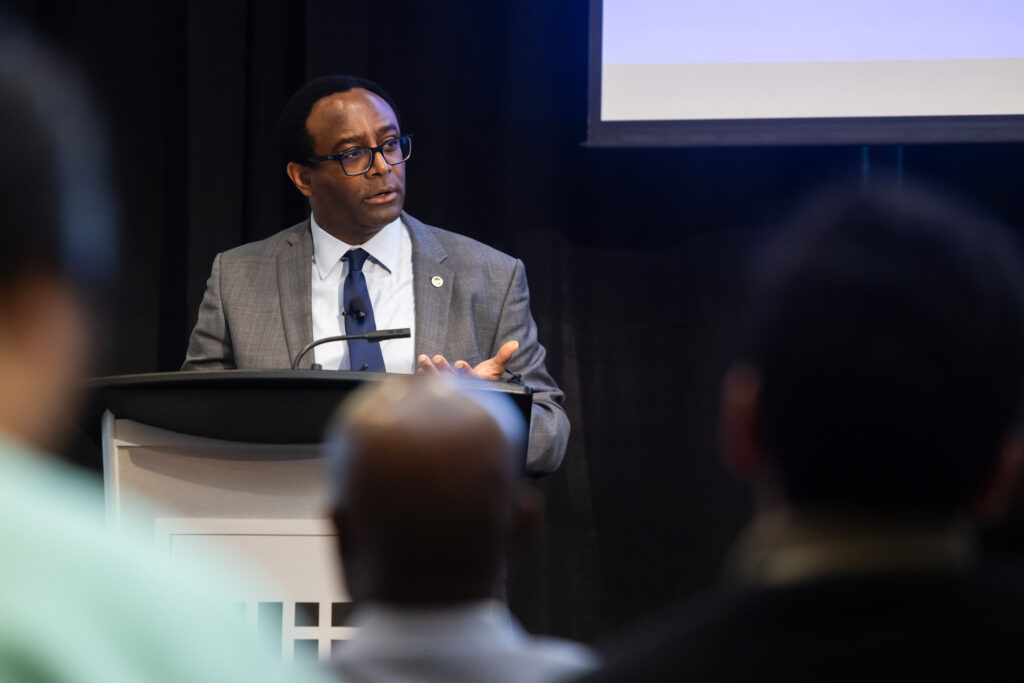Ben Vinson III, president of Howard College, made a compelling name for synthetic intelligence to be “developed with knowledge,” as he delivered MIT’s annual Karl Taylor Compton Lecture on campus Monday.
The broad-ranging discuss posed a sequence of looking questions on our human beliefs and practices, and was anchored within the view that, as Vinson mentioned, “Technological progress should serve humanity, and never the opposite method round.”
In the middle of his remarks, Vinson supplied ideas about our self-conception as rational beings; the results of technological revolutions on human duties, jobs, and society; and the values and ethics we wish our lives and our social cloth to replicate.
“Philosophers like Cicero argue that the nice life facilities on the pursuit of advantage and knowledge,” Vinson mentioned. “Can AI improve our pursuit of advantage and knowledge? Does it danger automating essential facets of human reflection? Does a world that more and more defers to AI for decision-making and creative creation, and even moral deliberation, does that replicate a extra superior society? Or does it sign a quiet give up of human company?”
Vinson’s discuss, titled “AI in an Age After Cause: A Discourse on Basic Human Questions,” was delivered to a big viewers in MIT’s Samberg Convention Heart.
He additionally urged that universities can function an “mental compass” within the growth of AI, bringing realism and specificity to the subject and “separating actual dangers from speculative fears, making certain that AI is neither demonized nor blindly embraced however developed with knowledge, with moral oversight, and with societal adaptation.”
The Compton lecture sequence was launched in 1957, in honor of Karl Taylor Compton, who served as MIT’s ninth president, from 1930 to 1948, and as chair of the MIT Company from 1948 to 1954.
In introductory remarks, MIT President Sally A. Kornbluth noticed that Compton “helped the Institute rework itself from an impressive technical college for coaching hands-on engineers to a very nice world college. A famend physicist, President Compton introduced a brand new give attention to elementary scientific analysis, and he made science an equal associate with engineering at MIT.”
Past that, Kornbluth added, “by means of the battle, he helped invent a partnership between the federal authorities and America’s analysis universities.”
Introducing Vinson, Kornbluth described him as a tutorial chief who initiatives a “fantastic sense of vitality, positivity, and ahead motion.”
Vinson grew to become president of Howard College in September 2023, having beforehand served as provost and govt vp of Case Western Reserve College; dean of George Washington College’s Columbian School of Arts and Sciences; and vice dean for facilities, interdisciplinary research, and graduate schooling at Johns Hopkins College. A historian who has studied the African diaspora in Latin America, Vinson is a member of the American Academy of Arts and Sciences and a former president of the American Historic Affiliation.
Utilizing historical past as a information, Vinson urged that AI has potential to considerably affect society and the financial system, even when it could not totally ship all the advances it’s imagined to carry.
“It serves as a Rorschach check for society’s deepest hopes and anxieties,” Vinson mentioned of AI. “Optimists, they see it as a productiveness revolution and a leap in human evolution, whereas pessimists warn of mass surveillance, bias, job displacement, and even existential danger. The truth, as historical past suggests, will probably fall someplace in between. AI will probably evolve by means of a cycle of inflated expectations, disillusionment, and eventual pragmatic inspiration.”
Nonetheless, Vinson urged there have been substantial variations between AI and a few of our earlier technological leaps — the commercial revolution, {the electrical} revolution, and the digital revolution, amongst others.
“Not like earlier applied sciences which have prolonged human labor, once more, AI targets cognition, creativity, decision-making, and even emotional intelligence,” Vinson mentioned.
In all instances, Vinson mentioned, individuals must be lively about discussing the profound results technological change can have upon society: “AI is not only about technological progress, it’s about energy, it’s about justice, and the very essence of what it means to be human.”
At a number of instances, Vinson’s remarks looped again to the topic of schooling and the impression of AI. Howard, one of many nation’s main traditionally Black faculties and universities, has not too long ago achieved an R1 designation as a college with a really excessive stage of analysis exercise. On the similar time, it has thriving applications within the humanities and social sciences that depend upon particular person cognition and inquiry.
However suppose, Vinson remarked, that AI ultimately finally ends up displacing a portion of humanistic scholarship. “Does a world with fewer humanities actually signify human progress?” he requested.
All advised, Vinson proposed, as AI advances, we’ve a accountability to have interaction with the advances and potential of the sphere whereas preserving on a regular basis human values in thoughts.
“Let’s information the world by means of this transformative age with extra knowledge, with foresight, and with an unwavering dedication to the widespread good,” Vinson mentioned. “This isn’t only a technological second. It’s a second that requires a type of mental braveness and ethical creativeness. Collectively, we are able to form an AI future that honors dignity for everybody, and on the similar time, advances the beliefs of humanity itself.”
